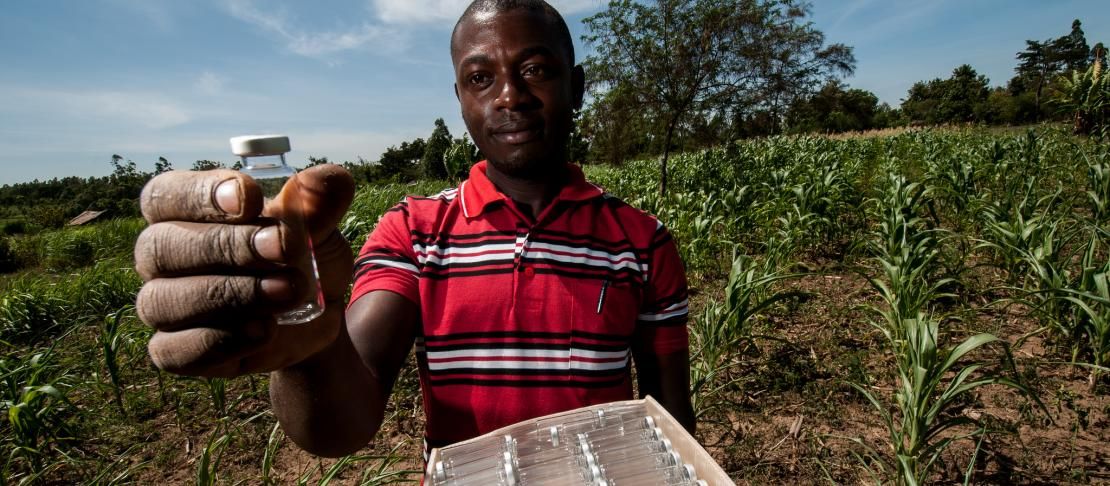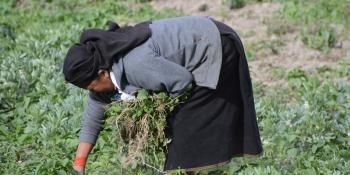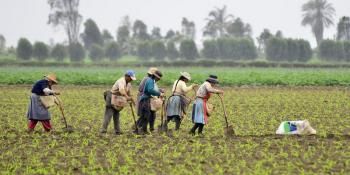CLIFF-GRADS awards record 33 fellowships for 2019 research on agricultural emissions and mitigation

33 fellows from 18 countries will partner with research organizations to advance the science on low emissions agriculture.
CLIFF-GRADS received applications from 243 graduate students from developing countries to study topics related to GHG emissions and carbon storage in agriculture and mitigation of greenhouse gas emissions from reduced food loss and waste this fall.
This group of applicants was the most competitive in the history of the CLIFF-GRADS program, in addition to being the most numerous. We think this speaks to increasing expertise and demand for evidence on low emissions development in agriculture and food systems."
Meryl Richards, Science Officer, Low Emissions Development Flagship, CGIAR Research Program on Climate Change, Agriculture and Food Security (CCAFS)
We’re delighted to see this talented group of early-career scientists contributing to such a diverse range of research projects in so many regions of the world. The knowledge being developed by our CLIFF-GRADS fellows will be of vital importance to farmers and policy makers worldwide."
Hayden Montgomery, Special Representative, GRA
The program’s growth also speaks to the quality of research being conducted. Dr. Emilio Ungerfeld, a research host from Chile’s agricultural research institute (INIA), described his experience hosting a 2018 CLIFF-GRADS fellow:
It´s been an enormous pleasure to have a CLIFF-GRADs fellow join our team. Her tireless commitment to the experiment and eagerness to learn have made a big difference to the project."
Emilio M. Ungerfeld, PhD, INIA, Chile
We are pleased to announce 2019 CLIFF-GRADS fellows and research projects:
| Name | Nationality | University | Research Project | Host Institution |
| CLIFF-GRADS Call: Greenhouse gas emission and emission reduction from agricultural production | ||||
Abmiael Ortiz-Chura (to be confirmed) | Peru | Universidad de Buenos Aires | Effect of modulating interspecies electron transfer exchanges on methane production and rumen microbiota composition | INRA, France |
Adnan Zahid | Pakistan | University of the Punjab | Using a Tier II Model (CQESTR) to Predict Soil Organic Carbon Storage and CO2 Emissions | USDA ARS, USA |
Bertin Takoutsing | Cameroon | Wageningen University | Accounting for errors in SOC estimates introduced by proximal sensing methods | ISRIC, The Netherlands |
| Bo-Wen Zhang | China | Institute of Mountain Hazards and Environment, CAS | Modeling pH effects on direct nitrous oxide emissions from agricultural soils through complex stable isotope labelling | Thünen Institute, Germany |
Camila Almeida dos Santos | Brazil | Federal University of Rio de Janeiro | Targeting N2O emission hot-spots in intensive dairy pastures for mitigation action | The University of Melbourne, Australia |
Deysi Ruiz Llontop | Peru | National Agrarian University La Molina | Quantification of carbon footprints in livestock production systems under contrasting management of Argentina | INTA, Argentina |
Hillaire Sanni Worogo | Benin | University of Parakou | Effects of rangeland management on soil carbon sequestration | USDA ARS, USA |
| Kofi Boateng | Ghana | Kwame Nkrumah University of Science and Technology | Nitrogen fertilizer rate, crop residue amount and soil water content influence on N2O emissions | USDA ARS,USA |
Lai Lai (to be confirmed) | Myanmar | Universiti Putra Malaysia | Compiling a structured Rice Policy Information Portal and demonstrating its potential use in mitigation projects | IRRI, Philippines |
Lamfu Fabrice Yengong | Cameroon | University of Buea | Manure management interventions to mitigate greenhouse gas emissions | ILRI Mazingira Centre, Kenya |
Lucélia de Cássia Rodrigues de Brito | Brazil | Federal University of Piauí | Cover crop and animal manure impacts on soil N2O emissions | USDA ARS, USA |
| María Carolina Scorcione Turcato | Argentina | Universidad de Buenos Aires | Directed evolution of rumen microbial cultures towards the identification and stimulation of electron sinks alternative to methanogenesis | INIA, Chile |
| Mariana Eloisa Garcia Ascolani | Paraguay | University of Florida | RumenPredict: Predicting appropriate GHG mitigation strategies based on modelling variables that contribute to ruminant environmental impact | |
Mónica Gabriela Perez | Argentina | University of Buenos Aires | Understanding the controls of N2O emissions in grazed upland and lowland systems | |
Noriel Angeles | Philippines | University of the Philippines Los Baños | Toward low methane-emitting rice varieties | IRRI, Philippines |
Ntwanano Moirah Malepfane | South Africa | University of KwaZulu-Natal | Comparing deep soil carbon stocks under kiwifruit and pasture land use | Institute for Plant & Food Research, New Zealand |
Paul Soremi | Nigeria | Federal University of Agriculture, Abeokuta | Turning to rice cultivars for solving the methane puzzle in irrigated rice systems | CIAT - FLAR, Colombia |
Pierre Eke | Cameroon | University of Yaounde | Soil organic matter sensitivity to land management impact on grasslands and croplands | Thünen Institute, Germany
|
Rangarirayi Lucia Mhindu | Zimbabwe | Chinhoyi University of Technology | GHG emissions from adequately managed rangelands in Kenya | ILRI Mazingira Centre, Kenya |
Ricardo González Quintero | Colombia | Universidad de Antioquia. Medellín | Measuring ammonia emissions and collecting farm data from Costa Rican dairies | CATIE, Costa Rica |
Samuel Anuga | Ghana | University of Ghana | Just how smart are the climate smart options promoted in the Climate Smart Villages of Nicaragua? | CIAT - FLAR, Colombia |
Sebastian Bedoya Mazo | Colombia | University of Antioquia | Quantifying Hydrogen fluxes and their impact on methane production equations | INRA, France |
Sikiru Yusuf Alasinrin | Nigeria | Federal University of Agriculture, Abeokuta | Net greenhouse gas emissions and soil carbon sequestration in response to tillage systems and cropping sequences | USDA ARS, USA |
Thi Thanh Ha Do | Vietnam | Southern Cross University | Assessing (agro)forestry landscape restoration options in livestock-degraded regions of montane Kenya and Tanzania | CIFOR, Kenya |
Titis Apdini | Indonesia | Wageningen University | Economic implications of greenhouse gas mitigation from dairy and beef systems | |
Victor Ilich Alvarado Bolovich | Peru | National Agrarian University La Molina | GHG mitigation strategies on cow/calf production systems | INTA, Argentina |
Yuri Gelsleichter | Brazil | Federal Rural University of Rio de Janeiro | Assessing the impact of land use change scenarios on soil organic carbon stocks | ISRIC, The Netherlands |
| CLIFF-GRADS Call: Greenhouse gas emission and emission reduction from reduced food loss and waste | ||||
Daniele Eckert Matzembacher | Brazil | Universidade Federal do Rio Grande do Sul | Measure FLW reduction and associated emission reductions of Brazilian entrepreneurship initiatives in fruits and vegetables that do not meet retail aesthetic standards | SLU, Sweden & Brazil
|
Laura Holguin | Colombia | Technical University of Dresden | Characterize digestate option with different combinations of available waste, including yield impacts, methane, and soil-based emissions | CIAT, Colombia |
Li Xue | China | Chinese Academy of Sciences | Quantifying GHG emissions of agrifood chain and associated food loss and food waste in China: an input-output analysis. | Syddansk University, Denmark & China |
Norah Titiya Machinjiri | Malawi | Haramaya University | Effects of organic matter soil amendments on population dynamics of Aspergillus flavus and its natural antagonists; and on groundnut aflatoxin contamination in Malawi. | ICRISAT, Malawi |
Tabitha Nindi | Malawi | Purdue University | Understanding smallholder farmers' storage habits in Malawi. | MUST, Malawi |
Xia Liang | China | The University of Melbourne | Evidence base for the mitigation of nitrous oxide emission from reduced food loss and waste in China and Myanmar | Hokkaido University, China & Myanmar |
In 2019, we anticipate issuing similar calls for research stays to be conducted in 2020. To hear about the call, sign up for our Low Emissions Development newsletter here.
Climate Food and Farming - Global Research Alliance Development Scholarships (CLIFF-GRADS) are implemented by CCAFS, the GRA and Aarhus University in collaboration with host researchers from 28 institutions. Funding is provided by the New Zealand government and via support to CCAFS from CGIAR Trust Fund Donors and through bilateral funding agreements. The United States government, through the USAID Sustainable Landscapes program, supports the fellowships to research food loss and waste.
Read more:
Webpage: CLIFF-GRADS
Julianna White is the program manager for CCAFS Low Emissions Development Research. She is based at the University of Vermont.



